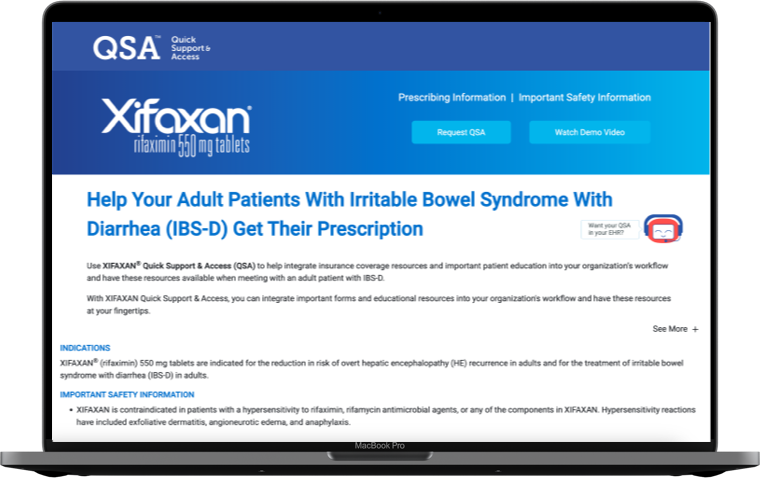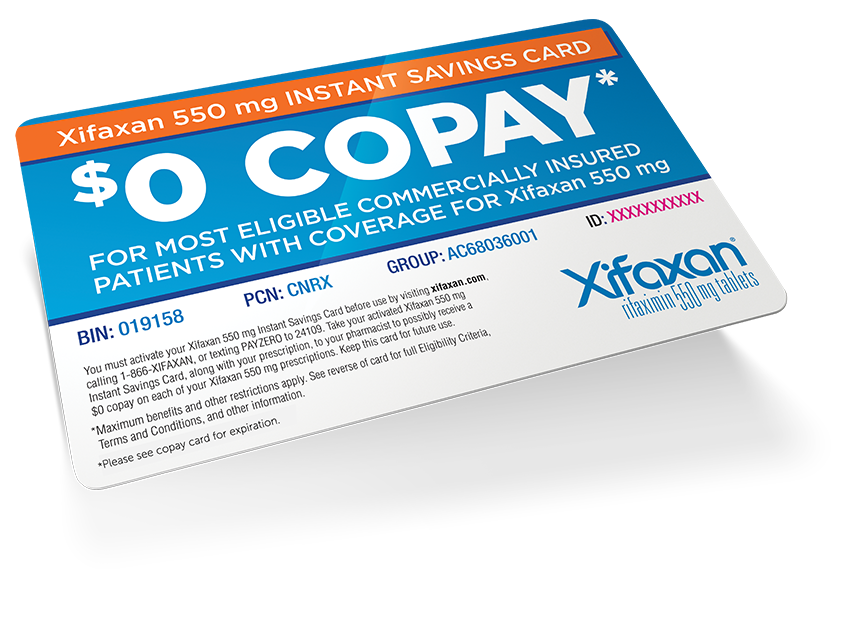A Helpful Suite of Clinical Resources for Your Practice
Access clinical tools for use with patients as well as multimedia resources providing information on diagnosis of irritable bowel syndrome with diarrhea (IBS-D) and treatment of IBS-D in adults with XIFAXAN.
My Approach: Making a Positive IBS-D Diagnosis A Practical Overview Featuring Mackenzie McArthur, PA-C, Atrium Health
My Approach: Making a Positive IBS-D Diagnosis A Practical Overview Featuring Mackenzie McArthur, PA-C, Atrium Health
Mackenzie McArthur, PA-C, demonstrates how she uses a guideline-based approach and clinical criteria to make a positive diagnosis of IBS-D.
Download GuideClinical Tools
Positive Diagnosis Guide for IBS-D
Informational guide for diagnosing IBS-D, including clinical criteria and suggestions for conversation starters you can use with your patients.
Download PDF >IBS-D Patient Discussion Guide
Encourages patients to have a discussion with their healthcare provider about the symptoms they experience. Have your patients complete the quick discussion questions to aid in discussions and symptom-based diagnosis of IBS-D.
Download PDF >Educational Resources
Patient Profile: 29-Year-Old Male With IBS-D
Portrays a patient who was referred to a gastroenterology specialist for frequent diarrhea accompanied by abdominal pain. Consult this profile to help recognize patients for whom XIFAXAN may be an appropriate therapy.
Download PDF >Patient Profile: 38-Year-Old Female With IBS-D
Portrays a patient who presented to her primary care provider with frequent abdominal pain associated with diarrhea. Consult this profile to help recognize patients for whom XIFAXAN may be an appropriate therapy.
Download PDF >IBS-D Special Report
Features diagnostic and treatment recommendations for IBS-D and real-world perspectives from Mark Pimentel, MD, and Amy Kassebaum-Ladewski, PA-C, RD, MMS.
Download PDF >Patient Case Study Videos Handout
Download and share this handout with your peers to direct them to IBS-D and overt HE patient case studies presented by practicing APPs.
Download PDF >Expert Discussion: ACG Recommendation for XIFAXAN
Watch Dr. Cash discuss the inclusion of XIFAXAN as a treatment for adults with IBS-D in the American College of Gastroenterology’s 2020 Clinical Guideline on Managing IBS-D.
Expert Discussion: Treating IBS-D as a Multi-Symptom Condition
Watch Dr. Brenner explain the importance of recognizing and treating patients suffering from IBS-D.
Expert Discussion: The Role of Dysbiosis in the Pathophysiology of IBS-D
Dr. Chang’s extensive research has focused on understanding how the GI microbiome can affect health and lead to disease. In this video, watch Dr. Chang explain the role of dysbiosis in the pathophysiology of IBS-D.
Expert Discussion: Role Gut Microbiota May Play in the Etiology of IBS-D
Discussion from experts Mark Pimentel, MD, and Darren Brenner, MD, on the importance of gut microbiota for regulating physiologic processes and maintaining health and how perturbations have been associated with several diseases, including IBS-D. Watch to learn how bacterial imbalances may occur and how they may be associated with the pathophysiology of IBS-D in some patients.1-9
Expert Discussion: Managing IBS-D Symptoms
Discussion from experts Mark Pimentel, MD, and Darren Brenner, MD, on nonpharmacologic and pharmacologic interventions to help manage IBS-D. Includes a discussion from Joscelyn Greaves, NP, and one of her patients on the challenges of living with IBS-D.
Expert Discussion: Pathophysiology of IBS-D and Mechanism of Action of XIFAXAN
Discussion from expert Mark Pimentel, MD, on the complex pathophysiology of IBS-D and the mechanism of action of XIFAXAN.
XIFAXAN Quick Support & Access (QSA) Plugin and Order Set Kit

XIFAXAN Quick Support & Access (QSA) Plugin and Order Set Kit
Standardize the process within your workflow to help identify and manage adult patients with IBS-D. With the XIFAXAN QSA plugin, you can integrate important forms and resources into your organization’s workflow and have these resources at your fingertips.
Access XIFAXAN QSAClinical Tools
XIFAXAN Dosing for IBS-D
Review the recommended dosing for IBS-D in adults and for the reduction in risk of overt hepatic encephalopathy (HE) recurrence in adults. Refer to this dual-indication card for XIFAXAN dosing – includes the ICD-10 code* for IBS-D.
Download PDF >XIFAXAN Patient Brochure
Informational brochure for patients that provides an overview of IBS-D and treatment with XIFAXAN, including how XIFAXAN works, how to take XIFAXAN, efficacy, safety, and most common side effects. Provide this brochure to patients to help them understand treatment with XIFAXAN.
Download PDF >XIFAXAN Prior Authorization Road Map
Step-by-step guide for completing prior authorization (PA) requirements for patients prescribed XIFAXAN, including common reasons for PA denials and guidance for Letters of Medical Necessity when needed. Download for guidance on PA requests, as well as information on electronic submissions with CoverMyMeds.
Download PDF >Tier Exemption Request Form
A tier exemption request to reduce the cost-share of a medication. Follows submission of a prior authorization or utilization management request.
Download PDF >Sample Letter of Medical Necessity
A standard form for a patient-specific letter of medical necessity to explain your clinical decision-making in choosing a therapy.
Download PDF >XIFAXAN Savings Card
Most eligible† patients with commercial insurance and coverage for XIFAXAN may pay as little as $0 for their XIFAXAN prescription. Maximum benefits and other restrictions apply.
Get savings card >Educational Resources
XIFAXAN IBS-D Treatment Guide
Quick-hit guide about XIFAXAN that highlights efficacy and safety data, dosing, and the steps to complete a prior authorization. Download and share this guide with colleagues who may less frequently treat adult patients with IBS-D.
Download PDF >XIFAXAN Product Details
Core information on XIFAXAN for the treatment of IBS-D in adults and for the reduction in risk of overt hepatic encephalopathy recurrence in adults. Provides an overview of symptom-based diagnosis of IBS-D, pathophysiology, and efficacy and safety data for XIFAXAN, as well as information on insurance coverage. Obtain key product details about XIFAXAN in one informational brochure.
Download PDF >Ensure XIFAXAN Prescriptions Are Written Correctly
Watch as Clinical Pharmacy Specialist Ralph Riello, PharmD, walks you through best practices to help with XIFAXAN prior authorization.
Expert Discussion: Treating IBS-D With XIFAXAN
Discussion from experts Mark Pimentel, MD, and Darren Brenner, MD, on the efficacy and safety of XIFAXAN in clinical trials. Includes a discussion from Joscelyn Greaves, NP, and one of her patients on how XIFAXAN was able to help manage her IBS-D. Learn how XIFAXAN may be able to help your adult patients with IBS-D and how to appropriately set expectations prior to treatment.
Expert Review: Efficacy and Safety of XIFAXAN
Presentation by expert Mark Pimentel, MD, on the efficacy and safety of XIFAXAN in clinical trials. Review key data supporting the use of XIFAXAN for your adult patients with IBS-D.

Help your eligible† patients save on XIFAXAN.
$0 copay for most eligible,† commercially insured patients with coverage for XIFAXAN. Maximum benefits and other restrictions apply.
*The ICD-10 Codes and all other patient-access-related information are provided for informational purposes only. It is the treating physician’s responsibility to determine the proper diagnosis, treatment and applicable ICD-10 Code. Salix Pharmaceuticals does not guarantee coverage or reimbursement for the product.
†Patient is not eligible if he/she participates in or seeks reimbursement or submits a claim for reimbursement to any federal or state healthcare program with prescription drug coverage, such as Medicaid, Medicare, Medigap, VA, DOD, TRICARE, or any similar federal or state health care program (each a Government Program), or where prohibited by law. Patient must be enrolled in, and must seek reimbursement from or submit a claim for reimbursement to, a commercial insurance plan. Offer excludes full cash-paying patients. Maximum benefits and other restrictions apply. Visit https://xifaxan.copaysavingsprogram.com/ or call 1-866-XIFAXAN for full eligibility criteria, terms and conditions.
